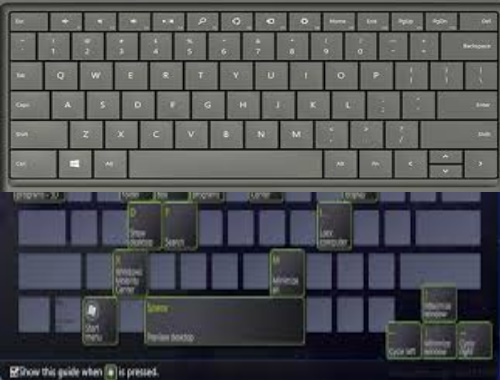All Important Windows keyboard Shortcut and Functions in Windows 8. Windows shortcut keys become more useful for you, when you complete any task instantly. If you know well about all shortcut keys, Function keys, you will feel convenient in accomplishing any task. Windows keyboard shortcut keys save your time as well as easy to operate. Here in this article, You will find a lot of or all Windows keyboard shortcut key in one place.

Important Windows keyboard Shortcut
| Windows 8 Keyboard Shortcuts | |
General |
|
| F1 | Appear Help |
| F2 | Rename any files or folders |
| F3 | Search for a file or folder |
| F4 | Display the address bar list in File Explorer |
| F5 | Refresh the active window |
| F6 | Cycle through screen elements in a window or on the desktop |
| F10 | Activate the Menu bar in the active app |
| Alt+F4 | Close the active item, or exit the active app |
| Alt+Esc | Cycle through items in the order in which they were opened |
| Alt+underlined letter | Perform the command for that letter |
| Alt+Enter | Display properties for the selected item |
| Alt+Spacebar | Open the shortcut menu for the active window |
| Alt+Left arrow | Back |
| Alt+Right arrow | Forward |
| Alt+Page Up | Move up one screen |
| Alt+Page Down | Move down one screen |
| Alt+Tab | Switch between open apps (except desktop apps) |
| Ctrl+F4 | Close the active document (in apps that allow you to have multiple documents open simultaneously) |
| Ctrl+A | Select all items in a document or window |
| Ctrl+C (or Ctrl+Insert) | Copy the selected item |
| Ctrl+D (or Delete) | Delete the selected item and move it to the Recycle Bin |
| Ctrl+R (or F5) | Refresh the active window |
| Ctrl+V (or Shift+Insert) | Paste the selected item |
| Ctrl+X | Cut the selected item |
| Ctrl+Y | Redo an action |
| Ctrl+Z | Undo an action |
| Ctrl+plus (+) or Ctrl+minus (-) | Zoom in or out of a large number of items, like apps pinned to the Start screen |
| Ctrl+ mouse scroll wheel | Change the size of desktop icons or zoom in or out of a large number of items, like apps pinned to the Start screen |
| Ctrl+Right arrow | Move the cursor to the beginning of the next word |
| Ctrl+Left arrow | Move the cursor to the beginning of the previous word |
| Ctrl+Down arrow | Move the cursor to the beginning of the next paragraph |
| Ctrl+Up arrow | Move the cursor to the beginning of the previous paragraph |
| Ctrl+Alt+Tab | Use the arrow keys to switch between all open apps |
| Ctrl+arrow key (to move to an item)+Spacebar | Select multiple individual items in a window or on the desktop |
| Ctrl+Shift with an arrow key | Select a block of text |
| Ctrl+Esc | Open the Start screen |
| Ctrl+Shift+Esc | Open Task Manager |
| Ctrl+Shift | Switch the keyboard layout when multiple keyboard layouts are available |
| Ctrl+Spacebar | Turn the Chinese input method editor (IME) on or off |
| Shift+F10 | Display the shortcut menu for the selected item |
| Shift with any arrow key | Select more than one item in a window or on the desktop, or select text within a document |
| Shift+Delete | Delete the selected item without moving it to the Recycle Bin first |
| Right arrow | Open the next menu to the right, or open a submenu |
| Left arrow | Open the next menu to the left, or close a submenu |
| Esc | Stop or leave the current task |
Windows logo key |
|
| Windows logo key + F1 | Open Windows Help and Support |
| Windows logo key | Display or hide the Start screen |
| Windows logo key + B | Set focus in the notification area |
| Windows logo key + C | Open the Charms |
| Windows logo key + D | Display and hide the desktop |
| Windows logo key + E | Open File Explorer |
| Windows logo key + F | Open the Search charm and search for files |
| Windows logo key + H | Open the Share charm |
| Windows logo key + I | Open the Settings charm |
| Windows logo key + K | Open the Devices charm |
| Windows logo key + L | Lock your PC or switch people |
| Windows logo key + M | Minimize all windows |
| Windows logo key + O | Lock device orientation |
| Windows logo key + P | Choose a presentation display mode |
| Windows logo key + Q | Open |
Thanx…

9 thoughts on “Tips : All Important Windows keyboard Shortcut and Functions in Windows 8”